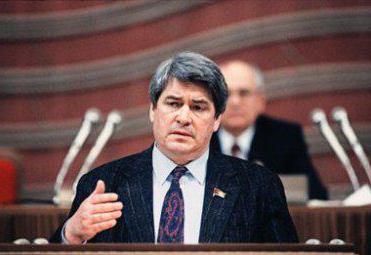In the era of great changes that ended the seventy-year history of the Soviet Union, there were a number of key figures that became a symbol of this time. Yuri Afanasyev is a Russian politician, scientist and public figure . He left this world on September 14, 2015. Which is another reason to take a closer look at the personality of this outstanding person.
Biography Facts
The future Russian politician Yuri Afanasyev was born on September 5, 1934 in the small Volga village of Maina. Very little is known about the young years of the future "construction superintendent". But the fact that after graduating from high school he went to the capital and entered the most prestigious university of the Soviet Union deserves attention. After studying at the Faculty of History of Moscow State University, he was sent to the distant Siberia in the Komsomol order to build the Krasnoyarsk hydroelectric power station.
At this shock construction site, Yuri Afanasyev spent about nine years. The responsibilities of the Komsomol functionary included the reception and home improvement of young people sent to the construction site from all regions of the USSR. In 1966, Yuri Afanasyev, whose biography at the first stage was quite ordinary, returned to Moscow. Big things awaited him ahead.
Scientific work
After returning to the capital, the career of the Komsomol worker went up. However, he decided to change the nomenclature service in the party-Komsomol bodies to scientific activity. In 1971, Yuri Afanasyev graduated from graduate school of the Academy of Social Sciences under the Central Committee of the CPSU. After that, he begins to conduct active scientific and administrative activities. Twice leaves for an internship in France at the famous Sorbonne University. His publications are recognized in the scientific world, which ensures successful career advancement at the Institute of World History of the USSR Academy of Sciences.
He becomes a doctor of historical sciences, a professor, is elected an academician of the Russian Academy of Natural Sciences. In 1983, Yuri Afanasyev became a member of the editorial board of the journal "Communist". He conducts active public work, acts in the media.
Care for politics
In the second half of the eighties, radical changes took place in the social and political life of the Soviet Union. New people come to the forefront of the political scene, among whom was Yuri Afanasyev. His biography makes a turn along with the whole country. Of course, this was not an accident. At a turning point in the history of the country, Yuri Afanasyev came as an authoritative public figure, to whose opinion it was customary to listen. This reputation was due to his publications on sensitive social and historical topics. Afanasyev’s articles in the New World and Ogonyok attracted attention and often provoked heated discussions among the thinking part of Soviet society.

Not everyone agreed with the historian, but his ideas about the need for radical transformations in all spheres of social and economic life of Soviet society fell into prepared soil and sprouted. In 1989, Yuri Afanasyev was elected People's Deputy of the USSR. At the famous first congress, he takes part in the Interregional Deputy Group.
"Construction superintendent"
At the end of the eighties, Yuri Afanasyev, whose photo could often be seen in the front pages of periodicals, became one of those with whom public opinion was connected with the changes taking place in the country. Some of the journalists came up with a slightly ironic definition for them - "foremen of perestroika." But Yuri Afanasyev himself preferred to distance himself from such a title. Subsequently, he repeatedly emphasized that he was always critical of Mikhail Gorbachev and the direction in which the socio-political system of the Soviet Union was being reformed.
But be that as it may, it was Yuri Afanasyev who became the author of the famous definition of “aggressively obedient majority”, which he described as the conservative part of the deputies of the first congress. This apt expression has firmly entered the modern political vocabulary.
Last years
In the 2000s, Yuri Afanasyev moved away from active political activity. The results of the changes in the country were not enthusiastic. He often spoke in the media criticizing the course of the country's current political leadership and expressed support for leaders of the non-systemic opposition. But his statements did not cause significant public resonance . The authority and influence of a politician is a thing of the past.
Nevertheless, it cannot be said that they forgot about him. This is evidenced by the number of people who came on September 17, 2015 for a civil requiem in the Sakharov Center. Yuri Afanasyev was buried at the Ostashkovsky cemetery in the city of Mytishchi in the suburbs.